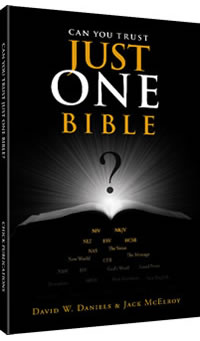Did the Catholic Church Give Us The Bible?
 From "Answers To Your Bible Version Questions"
From "Answers To Your Bible Version Questions"© 2001 by David W. Daniels
Question: Wasn’t it the Catholic Church that was responsible for the Bible being written?
Answer: No. The Catholic Church tried to take credit for what the Lord did without their help.
Here is a short history of the Bible.
1. Old Testament
The Old Testament was written by Moses, David and Solomon, prophets, seers and kings. There was no "church" of any kind to claim responsibility for it. God inspired individuals to bring God's word to the people. The Old Testament is the recorded revelation of God up until about 400 BC.
2. The Inter-Testamental Period
The time between about 400 BC and about 5 BC is usually called the Years of Prophetic Silence. This is because God created a process that lasted 400 years to create a world climate ready for the coming of the promised Messiah. There was no "church" at this time, either. But there was the new creation of the "synagogue," since the Jewish people needed to worship God and did not have the Temple when they were in exile. When many came back 400-500 BC, they already had functional synagogues; and even though the Temple was being rebuilt by those returning from exile, the synagogue idea remained and more were built. This was the beginning of the "congregation" or "church" as we have it today.
But there was no Scripture being written during this period. That was yet to come after one came "in the spirit and power of Elias" (Luke 1:17).
3. The Time of Christ
It is likely that Matthew (Levi) the tax collector and later disciple of Jesus took notes of what happened during Jesus' ministry. However, it is also true that were God in the flesh living among you, His words would burn into your soul. I am sure, as the apostles clearly recollected as they wrote the New Testament (2 Peter 1:16-21; 1 John 1:1-3; 4:14), they could not escape the image and words of Jesus Christ, God the Son and Son of God, when He spoke into their hearts (Luke 9:44; 24:32).
But it wasn't a "church" that made them write.
2 Timothy 3:16-17
16 All scripture is given by inspiration of God, and is profitable for doctrine, for reproof, for correction, for instruction in righteousness:17 That the man of God may be perfect, throughly furnished unto all good works.
And
2 Peter 1:19-21
19 We have also a more sure word of prophecy; whereunto ye do well that ye take heed, as unto a light that shineth in a dark place, until the day dawn, and the day star arise in your hearts:20 Knowing this first, that no prophecy of the scripture is of any private interpretation.
21 For the prophecy came not in old time by the will of man: but holy men of God spake as they were moved by the Holy Ghost.
God the Holy Spirit inspired them, perfectly and accurately, to write the words of God for the church. The church did not "inspire" anything.
4. The Church Age
When the apostles wrote their letters, the congregations received them. They read them. They spread them. They copied them for other brethren in Christ Jesus. And they recognized their authority in the Christian's life. So the Scriptures were produced by men of God, not by "the church." But they were produced FOR the church.
The last book of the Bible was Revelation, written about 96 AD, just before the apostle John died around 100 AD. After the apostles died, the churches continued to collect the letters they did not have, to read them and understand the authority under God by which they wrote.
But no one else shared that place. There is an "epistle of Barnabas" (which bears no proof it was written by Barnabas), which many think was penned in the first century. But the difference between its message of salvation and of the apostolic writings is too easy to see. If you believe the Scriptures, you cannot believe the so-called "epistle of Barnabas."
There are the writings of Polycarp, disciple of John (when John was very aged). There are writings of Clement and others. But those are all writings of Christians. Just Christians. Some were even martyrs, but their writings depended on the Scriptures--they were not Scripture themselves. Anyone who would base their faith on them would have a horrid foundation, just as if there were "Lutherans" today, learning of God's word only what they find in Martin Luther's writings. Interesting writing, at times "inspirational" writing, fine. Inspired? Not a chance.
The Roman Catholic church has had only one aim from its earliest, pagan and political origins: To destroy the true Christians, and to destroy their Bible. That is why they substituted the corrupt Alexandrian perversions of scripture, instead of using the preserved, prophetic and apostolic Words of God as found in Antioch of Syria, where "the disciples were first called Christians" (Acts 11:26). That is why they also added the Alexandrian writings we now call "Apocrypha" to their perverted bibles. That is why they used their Jesuits to infiltrate the Protestant Seminaries, Colleges and Bible Schools. Their Jesuits became the "teachers" and planted seeds of doubt in the Christians' minds. These doubt-ridden Christians then taught at other colleges and schools. All the while they planted that same seed of doubt of God's word in their students.
The stage was set: Once people no longer believed in God's Preserved Words, which we find perfectly presented in the King James Bible, they were ripe for destruction. Now, 120 years after the switch from God's Word to devil's lies (the King James abandoned for the Alexandrian texts), while pretending to "improve" our copies of God's words, they really set up the abandonment of God's words. Now almost every Bible in the English-speaking world (and most other languages) is just another re-translation of the Alexandrian polluted stream.
Another way to view it is that the Scriptures as we find them preserved in the King James is like God's fountain ...
Jeremiah 2:13
13 For my people have committed two evils; they have forsaken me the fountain of living waters, and hewed them out cisterns, broken cisterns, that can hold no water.
And that's the point: The bible spewed out by the Catholic church, which now almost all Protestants and other Christians use, ... simply doesn't hold water.
- See more articles on related topics:
- Bible Versions
- Bible
- Counterfeit Bibles
- History of Preservation
Products of interest:
-

Answers to Your Bible Version Questions
224 pages
David W. Daniels answers difficult questions about the KJV. Learn how to defend the KJV and why you can trust it. -

Did the Catholic Church Give Us the Bible?
208 pages
The Bible has two histories. One is of God preserving His words through His people. The other is of the devil using Roman Catholic "scholars" to pervert God’s words and give us corrupt modern Bibles. -

Can You Trust Just One Bible?
160 pages
Answers to the most common anti-KJV accusations. -

Understandable History of the Bible
557 pages
You'll learn the history of the Bible in this well-documented but easy-to-understand book.
